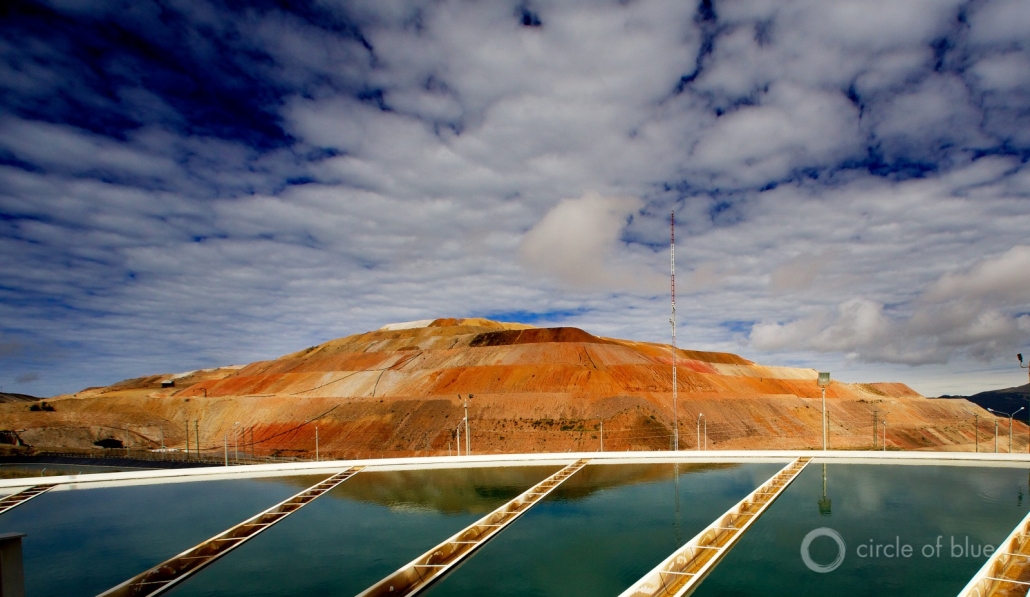Businesses play a key role in addressing the world’s water challenges.

“How industry responds to intensifying water scarcity and water quality risks globally will be critical.” Mines like the Yanacocha near Cajamarca, Peru, use water for processing gold ore. Photo © J. Carl Ganter / Circle of Blue
Kirsten James – March 22, 2022
The latest report from the Intergovernmental Panel on Climate Change — the world’s leading scientists on the climate crisis — painted a grim picture. It warned that almost across the board, the world stands on the precipice of unavoidable and irreversible adverse impacts from rising temperatures.
Drowned out in the rush of initial media coverage were the report’s findings on the havoc that the rapidly changing climate is already wreaking on the world’s water resources – a crisis that will only grow dramatically with the current trajectory of global warming.
The science is clear: the climate crisis is directly impacting the global water cycle and the distribution and availability of freshwater around the world, acting as a threat multiplier to the existing and severe water crisis, further stretching water resources and systems. For example, it is disrupting and speeding up global water cycles that drive precipitation and weather patterns in every corner of the planet. Climate change has also caused substantial damages – and irreversible losses – across water ecosystems.
The IPCC report documents how the extent and magnitude of climate change impacts are larger than estimated in previous assessments.
As long as greenhouse gases accumulate in the atmosphere, those risks will continue to rise. According to the IPCC: “Risks in physical water availability and water-related hazards will continue to increase by the mid to long-term in all assessed regions, with greater risk at higher global warming levels (high confidence).”
We know that the worst water impacts are felt by the most vulnerable populations. We know that human activity, from industrial development to farming and urban sprawl have all contributed to the water crisis. We know that without action things will get worse. Some reporters have summarized these key findings, but there is more to learn about how the private sector can and must fully engage in finding and implementing solutions.
So, what role does the private sector play?
Despite their dark assessment, the IPCC scientists give us hope by saying “there is still time to act.” But how? Industry – from food production to mining, apparel manufacturing to high-tech – is collectively the largest user and influencer of freshwater resources globally. Along with governments, the private sector is an integral component of the water cycle and has much to lose as critical climate and water risks grow. This presents an opportunity for collective action.
Investors and companies are positioned to lead the world in the innovation and adaptation needed to respond to the twin systemic threats of water and climate crises. In practice, that means:
- Investors must wake up to the reality that water is a material risk in their portfolios and develop a plan to address that risk. More information is needed to help a broader tent of investors fully understand how water risk impacts their portfolios. Providing evidence of the severe and systemic nature of industrial impacts to freshwater resources and identifying the worst offending sectors and practices would provide investors a “clear case” of the potential harm. An upcoming scientific report that Ceres is set to release in April will shed light on these areas to help accelerate understanding and action.
- Investors must understand the intersection of climate and water risks and be ready to engage. From water supply, water quality, ecosystem protection, and sanitation to business governance integration, public policy engagement and multi-stakeholder collaboration, investors also need tools to understand how to best engage with companies they invest in – and how they can be a key player in halting the systemic harm those industries cause. Later this year, Ceres will formally launch the Valuing Water Finance Initiative for investors to engage key water users and polluters across the global economy to adopt and implement corporate expectations for valuing water.
- Companies must identify their own water impacts and communicate to stakeholders their plans to address those risks. How industry responds to intensifying water scarcity and water quality risks globally will be critical to its long-term future and society at large. By focusing on, and investing in, these challenges today, companies can substantially reduce financial risks and bottom-line losses down the road. It is clear the status quo cannot continue. The same information that will help investors act on their risks can offer a framework for action and transparency to help companies respond and get ahead.
There is still time to act. Together, we can mobilize the power of the private sector to take unflinching action on the water crisis and preserve our precious water systems for generations to come.
Kirsten James is the water program director at Ceres. Ceres is a sustainability nonprofit organization working with the most influential investors and companies to build leadership and drive solutions throughout the economy.




